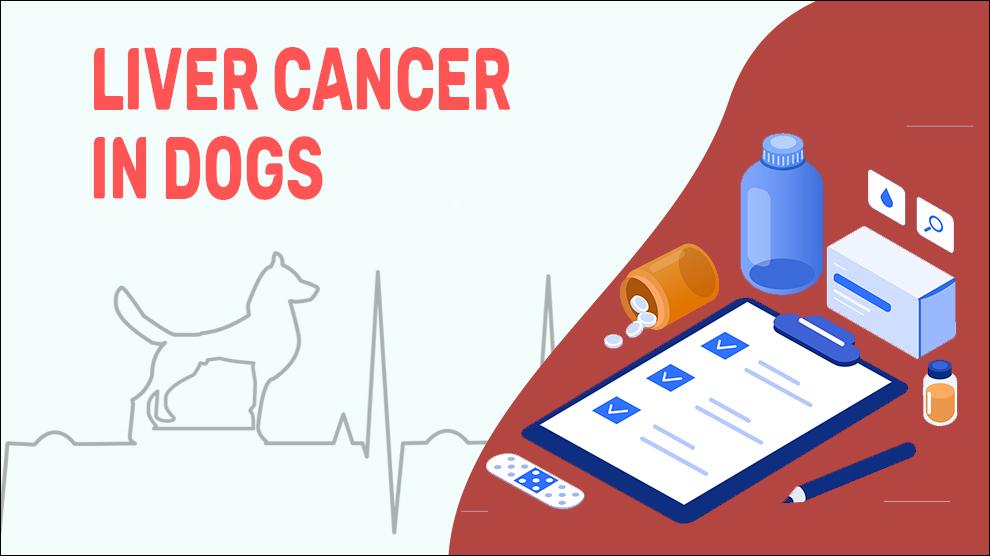What Is Liver Cancer In Dogs?
Malignant Liver tumors are one of the most common tumors and one of the leading causes of cancer mortality in dogs. Cancers that originate in the liver (primary liver cancer) is rare in dogs and tumor in the liver is mainly due to metastasis.
Primary liver cancer accounts for less than 2% of all tumors in dogs. Hepatocellular carcinoma (HCC) is the most common pathological type of liver cancer to originate in the liver. This cancer is believed to arise from the epithelial liver cells known as hepatocytes. HCC accounts for more than 80% of liver cancer cases. The rates of HCC and rates of primary liver cancer are roughly equivalent.
Intrahepatic cholangiocarcinoma is the second most common type of primary liver cancer. This type of cancer forms from cholangiocytes that line the bile duct. In the case of liver cancer, dogs often present the typical symptoms of liver failure, but most of the tumors can be non-symptomatic for quite some time. Sooner or later, the tumor will cause severe abdominal hemorrhage.
When a tumor from another part of the body metastasizes to the liver, it is called secondary liver cancer. Stomach, esophageal, pancreatic, kidney, lung, and several other cancers can metastasize to the liver; however, colorectal cancer tops the chart for secondary liver cancers. More than half of colorectal dogs develop secondary liver cancer.
Symptoms Of Liver Cancer In Dogs
- Jaundice- yellowing of your skin and eyeballs
- Hepatic encephalopathy (circling, disorientation, aggression, seizures)
- Discomfort or pain in your upper right abdomen
- Ascites (Abdominal swelling)
- Loss of appetite
- Diarrhea
- Nausea
- Vomiting blood/blood in stool
- Stomach ulceration
- Polydipsia/polyuria
- Kidney failure
- Weight loss/ Muscle loss
- Loss of appetite
Treatment Options For Liver Cancer In Dogs
A definitive diagnosis can be done by taking a liver biopsy to determine the type and severity of the tumor.
Treatment protocol for canine liver cancer is directed towards controlling the local tumor and tackling the concern for metastasis.
Surgical removal of tumor: the best chance for relief of clinical signs and the best survival times.
For local control, the most common options implemented are surgery and/or radiation therapy.
Liver cancer is often resistant to chemotherapy, and there are typically no consistent responses.
However, Chemotherapy is usually set aside as a rescue choice for tumors that have started to metastasize or recurred.
Home Remedies For Liver Cancer In Dogs
- Consult with your vet for foods (Hepato-Protectants) designed specifically for dogs with liver problems.
- Experienced pet owners may recommend a homemade diet.
- Antioxidants, artichoke extract, SAMe, Zinc, vitamin E, milk thistle, and other supplements can also be provided to support liver function.
How To Prevent Liver Cancer In Dogs?
Prevention is not possible for liver cancers. Treatment and survival rates vary depending on the grade and stage of the neoplasm.
Affected Dog Breeds Of Liver Cancer
Bedlington Terrier, Cocker Spaniel, Chihuahua, Doberman Pinscher, Labrador Retriever, Maltese, Skye Terrier, Standard Poodle, Springer Spaniel, West Highland White Terrier, Golden Retriever, German Shepherd, Poodle, Rottweiler
Causes And Diagnosis For Liver Cancer In Dogs
1. Causes:
- Genetics
- Endocrine diseases: Diabetes, Cushing's Disease, Hyperthyroidism
- Canine hepatitis, cholangiohepatitis
- Liver cysts
- Exposure to toxic chemicals
- Blocked or damaged tubes
2. Morbidity:
Liver failure is one of the main causes of morbidity and mortality in dogs. Acute liver disease (ALD) is defined as the absence of known preexisting liver disease and sudden liver dysfunction, meanwhile, acute liver failure (ALF) includes the above parameters and the presence of coagulopathy as well encephalopathy.
Only over 70% of the hepatocellular mass is diminished, and acute liver failure happens as there will be insufficient hepatic parenchyma to carry on excretory and synthetic homeostasis. The reduction of hepatic function is the reason for the clinical manifestations of ALF.
3. Mortality:
The prognosis is poor for liver cancer. Liver cancer has higher mortality rates in dogs.
4. Diagnosis:
- Urinalysis and bloodwork
- Serum biochemistry profile
- X-rays
- Ultrasound, CT scan
5. Prognosis:
For dogs receiving surgery for a hepatocellular carcinoma median survival time is approximately 3 years, while for affected dogs without surgery the survival rates are comparatively less. Liver tumor surgical removal has a good prognosis, and the dogs may live for years following treatment.
When To See A Vet For Liver Cancer In Dogs?
Contact your vet right away, if you notice any of the following:
- Yellow, jaundiced look to skin, gums, and ears
- Vomiting blood/blood in stool
- Swollen lymph nodes, neck, belly, and head
Food Suggestions For Liver Cancer In Dogs
- Protein - Lean beef, lean chicken or turkey breast, Cooked fish (tuna, salmon).
- Add lots of veggies (green leafy vegetables, broccoli, carrots, especially).
- Vitamin C foods – Citrus fruits, strawberries, potatoes, tomatoes.
- Antioxidants – Blackberries, Blueberries, Beets, Cauliflower, etc.
- Flavonoids - Cranberries, eggplant, etc.
- Beta carotene foods - Orange, yellow, and green leafy vegetables and fruits(such as carrots, tomatoes, lettuce, spinach, sweet potatoes, broccoli, cantaloupe, etc).
Foods to avoid:
- Say no to fried, ultra-processed, hard, or jagged foods (such as chips, Crunchy crackers, etc).
- Avoid dairy products.
- Hard to digest greasy foods and grains.
- Rice, pasta, and White bread.
- Fruit juices, Fatty/Fast Food Items, and Aerated/fizzy drinks.
Conclusion
When detected early and with appropriate treatments, the dog’s prognosis is usually good. Dog owners should consult with their veterinarian as soon as they notice the symptoms as some conditions can be very serious (and possibly fatal).

















